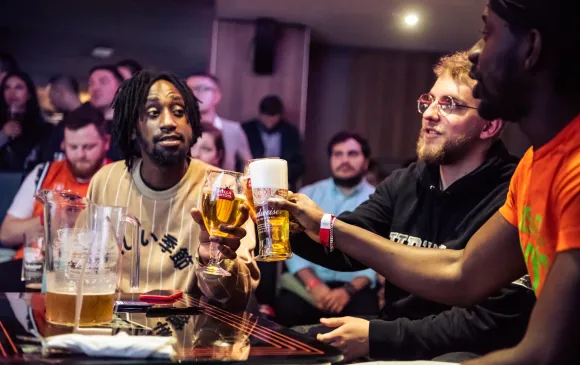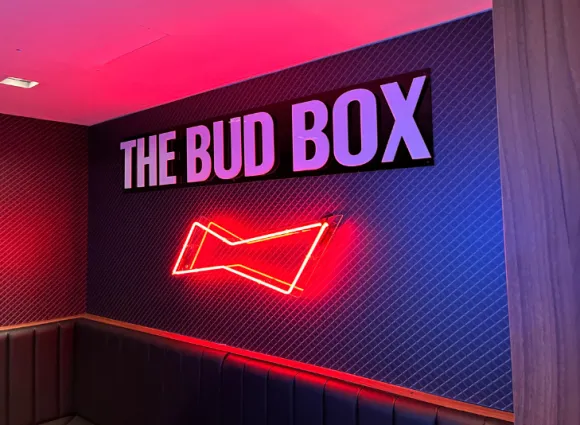Live and kicking
Football Action Unleashed!
Get ready to experience football paradise like never before! The Kings Sports Bar at Empire Casino London is your ultimate destination to catch all the Premier League action live and unfiltered. It's not just football; it's a fiesta of cheers, jeers, and ice-cold beers!
Step into the heart of the Empire Casino and immerse yourself in a lively atmosphere where the drama unfolds on the pitch and in your glass. Grab your friends, and let's be honest, maybe a few rival fans too – because where's the fun without some friendly banter?
Sink into plush seats, savour delicious bites, and let the drinks flow as the best of the Premier League goes head-to-head. It's not just a match; it's an experience that will leave you shouting, high-fiving, and maybe even shedding a tear or two – all in the company of fellow football fanatics.
Don't be just another armchair pundit. Make your way to the Kings Sports Bar and witness the magic of football live while surrounded by the energy of like-minded supporters.
So why wait? The Premier League belongs on the big screen, with a pint in hand – and it's all happening at Empire Casino London. Let the games begin!

The Bud Box
Why not book our private Bud Box complete with valet service, a fully stocked fridge full of Budweiser, and a private screen?
Holding up to six people, it’s the ultimate sporting experience for you and your mates.
Contact us and quote “Bud Box” to find out more or book.
What is the Premier League?
The Premier League is a top-tier professional football league in England. It is one of the world's most popular and competitive football leagues. The league consists of 20 teams that compete against each other over the course of a season, typically from August to May. Each team plays 38 matches, facing every other team twice – once at home and once away.
The Premier League was founded in 1992 when English football clubs decided to break away from the Football League in order to negotiate their own television broadcasting rights. Since then, the Premier League has grown in popularity and has become a global phenomenon, attracting viewers and fans from all corners of the world.
The primary aim of the teams in the Premier League is to win the league title by accumulating the most points throughout the season. Teams earn three points for a win, one point for a draw, and no points for a loss. At the end of the season, the team with the most points is crowned the Premier League champion. The teams that finish in the bottom three places are relegated to the lower division, known as the EFL Championship, and are replaced by the top teams from that division.
The Premier League is renowned for its fast-paced and competitive matches, showcasing some of the best football talent globally. It has also significantly shaped the modern football industry, with substantial television deals, global sponsorship, and a massive international fan base.
How does the Premier League work?
The Premier League operates on a simple yet competitive format that spans across a full season. Here's an overview of how it works:
Number of Teams: The league consists of 20 teams that compete against each other.
Fixture Schedule: Each team plays a total of 38 matches in a season. They face every other team twice – once at their home stadium and once away.
Points System: Teams earn points based on their match results: 3 points for a win, 1 point for a draw, and 0 points for a loss.
League Standings: The league standings are determined by the number of points earned. If two or more teams have the same number of points, their position is decided by goal difference (the difference between goals scored and goals conceded).
Title Race: The primary objective for most teams is to win the Premier League title. The team with the highest number of points at the end of the season is crowned the champion.
Champions League and European Qualification: The teams that finish in the top four positions qualify for the UEFA Champions League, which is the premier club competition in European football. The fifth-placed team and the winner of the FA Cup (if they haven't already qualified) usually earn spots in the UEFA Europa League.
Relegation: The teams that finish in the bottom three positions are relegated to the EFL Championship, the second tier of English football. They are replaced by the top two teams from the Championship and the winner of the Championship playoffs.
Promotion and Playoffs: The top two teams in the EFL Championship are automatically promoted to the Premier League. Teams that finish between third and sixth in the Championship compete in playoff matches to determine the third promotion spot.
Golden Boot and Awards: Individual awards are given out, such as the Golden Boot for the top goal scorer and the Player of the Season award.
Overall, the Premier League's format creates intense competition throughout the season, with each match having the potential to influence the title race, European qualification, and the battle to avoid relegation.
What are the biggest rivalries in the Premier League?
The Premier League is known for its intense rivalries between various clubs. Some of the biggest and most historic rivalries include:
Arsenal vs. Tottenham Hotspur: Known as the North London Derby, this rivalry pits two of London's most prominent clubs against each other.
Manchester City vs. Manchester United: The Manchester Derby features the city's two major football clubs, Manchester City and Manchester United, going head to head.
Liverpool vs. Everton: Known as the Merseyside Derby, this rivalry brings together Liverpool and Everton, the two major clubs from the city of Liverpool.
Liverpool vs. Manchester United: While the North West Derby is a major rivalry for both Liverpool and Manchester United, their head-to-head matches also hold a special place in the hearts of football fans due to the history and prestige of the two clubs.
How long does the Premier League last?
The Premier League season typically lasts for about 9 to 10 months. It usually begins in August and concludes in May of the following year. During this time, each of the 20 teams plays a total of 38 matches (19 home and 19 away), resulting in a comprehensive and competitive schedule that spans the majority of the year. The exact dates for the start and end of the season can vary slightly from year to year due to factors such as international tournaments and scheduling considerations.






